#to get to the fun bits
Explore tagged Tumblr posts
Text
Chariot and Wolf - Chapter 1 Preview (Part 1/ ?)
(Note: this comes from an earlier draft, so there might or might not be some small changes in the final version that’ll be uploaded to AO3 once the prologue is done.)
CONTEXT


Sneak-Peek:
Fate had always been in the realm of the gods, though even the gods were subject to it.
For as much as mankind, immortals, and gods believed they were the masters of their destiny and could control the little things in life, with those small decisions adding up to the everyday, the overall shape of their lives were not theirs to decide. They were at the mercy of the Moirai—the three Fates who weaved their futures from their spindles on their craftsman’s loom and snipped life threads short. From the beginning, the Fates determined which souls would be born, the course of events, what kind of lives they would live, and for how many days. It was always ever thus.
It was during the month of Hekatombaion, during the important Panathenaic Games held every four years to honor the goddess Athena, when Queen Anticlea fell into labor, sending all into an uproar. On a warm midsummer night, dark and moonless, the midwives, along with the queen’s female relatives and friends tending to her through the moving image of eternity, finally heard the wails of a healthy baby boy.
They had delivered the firstborn son of an Argonaut, King Laertes and his wife, Queen Anticlea.
Their kingdom, at last, had a legitimate heir.
Whilst the exhausted queen slept, the wet-nurse, a dark-haired woman who wore a kekryphalos—a wide-woven woven caul secured around the front of the head, with a pouch in the back where the majority of her hair was tucked inside the elastic cap—presented the sleeping newborn prince before the queen’s honored parents.
The honored servant was named Eurycleia; she had been sold to King Laertes as a young girl, having been treated as an honored servant in his household for many years, that she was almost regarded as the king’s second wife. However Laertes never had Eurycleia attend to him in the bed, out of respect for his principal wife whom he loved. As his trusted servant, Eurycleia had been tasked to attend to the baby’s needs during the queen’s postpartum recovery.
When the servant Eurycleia took this soft delicate creature into her arms, holding him with the utmost care and delicacy, she found herself seized with emotion. Eurycleia fell into a daze looking at the tiny sleeping face peeking from the blue swaddling cloth. Her heart swelled. Although he had been born from another woman’s womb, at this very moment, she felt a mother’s unconditional love wash over her.
Stepping forward, very gently Eurycleia laid the tender sleeping prince upon the aged Autolycus’ knees and addressed respectfully, “The Wolf Itself, Autolykos, you who have dared to battle wits against the craftiest of men, King Sisyphus, may you find a name to give to your child's own child; for he has much been prayed for.” She didn’t dare suggest a name to him, for it was neither her place nor did they share any blood ties, but she could provide a gentle hint.
Wearing a handsome wolf pelt draped over one shoulder, Autolycus, fleet-footed and fleet of fingers, cradled his grandson who had surprised everyone and whose sudden birth sent all into a flurry of panic. He scrutinized him. Looking at the wisps of soft dark down on the infant’s head, it was still much too early to tell whom this child would take after in appearance, whether it was his birth mother or his royal father—or perhaps someone else in their ancestry. But the prince’s penchant for trickery proved innate—perhaps an influence of the child’s great-grandfather. Peering at the infant’s ruddy cheeks, the old Autolycus was once again confronted with the disappointing reality that his family could not have the fortune of ichor running golden through their veins. Only red mortal blood.
Grazing his thumb over the child’s eyelid, he suddenly recalled the servants’ secret whisperings. The prince had been born with marigold eyes. Just like their daughter’s. Just like his. The sort that picked up whatever hue was near. Like a creek dappled in morning light, a dirty stain of gold, darkening into a warm brown around the two innermost black eclipses.
In the past, Autolycus had the dubious honor of being visited, and rewarded for his faithful sacrifices to him, by his swift-footed father with his gold wand, who’d been absent most of his life; glimpsed a glimmer of marigold beneath his shadowed features. There'd been a hint of twisted playfulness which had softened some of the immortal’s merciless edges, lending his youthful beauty a trace of humanness. There was something there, in the defined angles and deep shadows cast over the Messenger God’s marble-like face, the sharp line of his smooth clean shaven jaw, the two wicked slashes of his lips, the hollows of his cheeks, and a pair of eyes the color of pure unsullied ichor which glowed bright gold beneath the wide brim of his winged hat.
But just like strong wine which had been diluted with water, the more and more bloodlines would mix into theirs, the more watered down their bloodline would be. Autolycus’ own sons, as well as his two daughters, Anticlea and Polymede, and now this grandchild, proved evidence of that. None of his children could do something he found as simple as changing horned cattle into hornless ones and brown cows into white ones. Perhaps this was the fate of all borned demigods, who weren’t immortal, destined to live out a life more mortal than divine. There’d come a time in the distant future when the strength of their gifts faded, when a descendant from their bloodline would be no different from that of any other Achaean.
“Since I have angered many, both men and women,” Autolycus announced, in a moment of pure sardonic pique, "as I am a legendary untouchable thief hated by all, let the name of the child be ‘Odysseus.’” Lifting the infant higher with both hands, Autolykos told the future king, “I have high hopes for you, little Odysseus.”
Eurycleia bowed her head. To be wroth against, to be angry or cause hate—a fierce name, strong in meaning, bestowed as an honor to himself. The name betrayed the weight of Autolycus’ expectations and the value he placed on his grandson.
It was said that the Three Sisters of Fate spun a person’s destiny within three nights of their birth. The first sister, Clotho, a young maiden on the left, spun the fibres of a child’s life while in the womb into a single thread, from her distaff onto her spindle. The older and more matronly sister in the center, Lachesis, held the rod used to measure their golden thread of life, for the length of a child’s life, experiences, and the number of tribulations they were predestined to face were determined from her fingers. Then came Atropos—cronely, haggardly, old. Inevitable. The sister whom most were frightened by, for in her gnarled hand held the terrible shears used to cut the thread of life, choosing the manner and time of his or her death. Once cut, the soul would be sent into the Underworld to receive judgement and discharged to one of three destinations: Elysium, for the righteous souls who were to be rewarded; Tartarus, for the vicious souls who were to be punished; and the Fields of Asphodel, for the mediocre and ordinary. Feared by mortals and gods alike, the sisters pressed together to preside over a person’s fate—a prophecy foretold, their past, present, and future set in stone.
Odysseus was King Laertes’ firstborn son, born by the legitimate wife. So long as the king of Ithaca Laertes did not give sire to another son, and the prince suffered neither misfortune nor committed any unforgivable crimes, the course of this child’s destiny had already been charted out for him.
Three nights later, dark storm clouds rolled into Ithaca, heralded by dazzling claps of thunder and lightning that boasted an ocean of tears. The old Autolycus awoke with a start.
“Dear…?” his wife murmured drowsily.
Whatever Autolycus had been about to say to reassure her was interrupted when a flash of blistering color lifted the veil of darkness. His ears rang with the deafening unearthly screech of an eagle. There was a dangerous edge to the cry, like a thunderstorm about to erupt.
Like a bolt of lightning, the fine embroidered bedcover was flung off and Autolycus prostrated himself on the floor. He bellowed, “Zeus, O’ Wise King of the Gods, I heed your prophetic warnings! I give eternal thanks for your consideration and the everlasting grace you have shown to me and my family!”
Deep in Autolycus’ ambrosial sleep, he had dreamt Zeus had flown into his bedchambers in the guise of a large golden eagle, landing on the bedrest above the old swindler’s head. Sharp talons curled, majestic wings folded, a strong yellow beak preened his flight feathers. In the dream from heaven, disguised as a bird of prey, the god proclaimed in a deep, authoritative thunder clap: “Master of Thieves, Autolycus, do you dare sleep now when I come to you bearing a message? Listen closely now, for you are my messenger son’s son and, as far-off as I can be, I care about you and feel compassion.”
Like peering through a fog, Autolycus witnessed a war, and a fatal anger that would bring countless sorrows on the Achaeans, sending the souls of many valiant warriors to Hades, their bodies left behind as spoils for dogs and carrion birds on the broad-paved roads. He then witnessed the mightiest of all, aegis-bearing Zeus, he of the far-thundering voice, seated upon his throne composed of clouds at the gleaming Olympus, looking troubled; inclining his shadowed brow upon ambrosial locks, the Cloud-Lord thunderously forbade the company of gods from interfering in the quarrel of mortals.
Autolycus saw a massive wooden horse being wheeled into a city’s thick fortified gates, and forty soldiers pouring out of the large, hollowed underbelly in the dead of night to push the gates open. He beheld Odysseus—handsome, long-haired, and proud—commanding six hundred men to glory. He saw his grandson, looking fresh and bright after the war, setting sail homeward bound—and the innumerous sufferings he endured. The incidents, and the faces of many, flashed before Autolycus’ eyes like a series of quick lightning bolts.
A cave and the one-eyed monster that lived inside it—a horrid creature, not like a human being at all, but resembling a rugged mountain crag piercing the sky—dashed six of Odysseus’ men to the ground with his club until their brains splattered, tearing their corpse from limb from limb, gorging on their flesh, bones, and entrails; of Odysseus later thrusting a club of olive-wood in the ashes, and then having his men aim it straight and true, sharpened at the tip, into the cyclops’ eye—throwing his weight upon the beam from above, whirling the fiery-sharpened point in the socket like how a man would bore a ship’s timber with a drill, while those below kept it spinning with the thong, as the eyeball burned and boiling blood bubbled around the red hot beam; Autolycus’ ears deafened hearing the pained, earth-shattering roar whilst the surrounding flock of rams, well-fed and thick of fleece, brayed in fright; the monster’s crying had attracted the other savage cyclops who lived in the headlands near him.
In another flash, Autolycus was on a cliffside, and he saw what he assumed to be the silhouette of his grandson from a distance, joined by his crewmates who hastily set sail from the beaches. Dwarfing Autolycus in height, the blinded ogre had stretched both hands out to the starry heaven; his voice rumbled like two boulders grating together, praying to the lord Poseidon—that if he were the god’s true begotten son—to grant a curse upon “the valiant warrior, Odysseus, the sacker of cities and son of Laertes, who lives in Ithaca,” to never reach his home alive. Or that if it were Odysseus’ fate to see his friends, to derail the man’s voyage for as long as he could, for the captain to suffer greatly after losing all of his men, and to let him reach his home only in another man’s ship, and to find trouble in his own house. Curse after curse after curse spilled forth. And Poseidon heard his prayer.
Zeus hurled his bolt—and this time Autolycus opened his eyes to see the earth-encircling Poseidon commanding a giant whirlpool. Autolycus’ breath drew tight in his chest. Who could stand the weight of a god’s wrath? A titan towering over the twelve ships, Poseidon calmly declared to them their death sentence. With a majestic sweep of his divine trident, the black ocean swelled up into monstrous giant horses, surging over eleven ships—before crashing down, swallowing the screams of more than five-hundred crewmen. Autolycus watched as Odysseus’ face crumbled in despair. Over the sleet-like spray of salt water and sound of waves rocking the only ship spared, they could hear the god’s vindictive hiss: “Forty-three left under your command….”
“Cousin, Father Zeus; and you other everlasting and blessed gods,” a clear voice suddenly rang out. Loud, energetic, eager. The violent seas had vanished, replaced by sunlight, shining and radiant. Autolycus would recognize that voice anywhere, having pilfered a dagger from the god: Helios the Sun, the one who saw everything. The god threatened, “I ask you to punish the companions of Odysseus, son of Laertes; for they outrageously killed my cattle, in whom I always delighted on my way up into the starry heaven, or when I turned back again from heaven toward earth. I demand just recompensation for my cattle, or you will see me go down to Hades’ and give my light to dead men!”
A bolt of lightning hurled blinded his vision—and this time Autolycus was overlooking his grandson from high above, up in the black clouds. From Zeus’ perspective, as judge, jury, and executioner. Odysseus looked wretched and disheveled, the bloodstain on his tunic blooming like a carnelian flower. “Choose.” Addressing Odysseus, Zeus’s voice was deep, like a storm coming, but gentle, like the rain ending. The god’s sonorous voice echoed through the hollow place of sorrow, reverberating in everyone’s eardrums. “Someone’s gotta die today and you have got the final say….” The last syllable was stretched long, a cruelty masked behind gaiety.
Another flash—and this time Autolycus was astonished to see the familiar tall figure of Athena, beloved daughter of Zeus, marching up to the imposing throne constructed of wispy cumulus clouds. Her voice boomed with authority in the sacred place, coming to Odysseus’ aid, pleading her case before Zeus to release him and to allow the pitiful king of Ithaca to return home. Her voice melded with five other opposing voices who engaged her, turn by turn, in fierce debate. That was all Autolycus was allowed to hear before his vision darkened, and he almost leapt with fright suddenly seeing the helmeted Athena brazenly point her bronze-tipped spear up at a furious Zeus.
The image of Zeus’ daughter raising her weapon against her heavenly father, this great primordial being whose form eclipsed the entire sky, in defense of Autolycus’ grandson, was seared into Autolycus’ eyes. Beholding the god’s true terrible form, Autolycus remembered the stories of the mad Titan, Kronos—he who mated his older sister Rhea—whose blood flowed in Zeus’ veins, as well as his ancestry with the Titans Ouranos, the sky, and Gaia, the earth. The goddess’ noble figure was the last thing he saw before his vision burned bright and a shroud of absolute darkness soon came falling down.
After the last vision, Zeus fell uncannily silent. In the absence of light, the darkness held a presence that was all the more felt because it was not seen. Autolycus heard the distant sound of waves striking the shore, forceful and strong and as constant as the deepest ocean currents; and it was as though the pounding of his heart was keeping in time with the sea’s great tides—the sound a familiar comfort, and every seafarer’s nightmare. A looming danger unable to mitigate.
“…That clever grandson of yours will run afoul of many great gods. These are a mere trifle I have deemed significant and allowed you to see.” The eagle lifted his beak from his feathers. Gazed at Autolycus with eyes blazing with golden ichor. “Odysseus of Ithaca is a man born to trouble. However his fate is to become a fine king of counsel, charged with an army, on whom responsibility so rests. He will go to engineer a clever trick so heinous, the war cannot be won without his strategy, contributions that thereby make him essential for it is fated that Troy will fall. As I will have decreed that us immortal gods cannot interfere in the war, I have effectively tied my own hands—for once I give my nod, my word can never be recalled; to prove true and fulfilled. Heed my only warning, Autolycus, as my wish is to preserve the sanctity of the natural divine order. Hold fast to this, remember all, when honey-tongued sleep frees you.”
With this, the eagle departed in a shower of golden sparks. When Autolycus woke, the divine voice was still ringing in his ears.
At present, he could feel his body ache; the cold floor was unforgiving on his old bones and stiff joints. Dread donned Autolycus’ troubled brow now that he was no longer constrained by sleep’s inability to doubt. Why give him, a thief who’d boasted he could steal undetected from the gods themselves, the grace of a divine vision? Why him—and not somebody else? Autolycus’ cunning mind raced, pondering Zeus’ intentions.
Could it be…? For Zeus to personally descend instead of sending down a messenger, did this not indicate that the god somewhat recognized their unacknowledged familial ties? Although Autolycus’ blood ran crimson, his relationship to the immortal gods of Olympus could be considered the strongest amongst his wives and children, for the blood of Hermes directly flowed through his veins. Disguising his warning as an omen, was their divine ancestor showing consideration for his children’s mortal descendants—however distant and negligible their relation might be, as neither Autolycus nor his children nor children’s children sprung from Zeus’ loins directly?
He heard his wife slip out from the comfort of the warm covers; her warm hands slipped underneath to support her kneeling husband from underneath his elbows. He snapped out of his thoughts. His pulse still thundering from the prophetic dream, gripping his wife by her arms, Autolycus announced feverously, “Beloved Amphithea, come with me to seek an audience with our daughter. We must make haste! For I have seen her son’s future!”
The old woman, seized with fear, obeyed her husband.
That night, Autolycus and Amphithea held an assembly with their daughter and their son-in-law. Listening to Autolycus recount his prophetic vision of an incoming war, Queen Anticlea—a woman of exemplary virtue and chastity—and King Laertes who was a man of honor, wisdom, courage, and a straightforward personality, were, understandably, afraid. Afraid for the state of their kingdom—and for their son. These secret discussions which rolled into the early hours of the next day, behind closed doors, would later come to define Odysseus’ life and rewrite history.
Yet, for all their preparation and well-laid plans, not once did it occur to them, if a person’s fate was something that could be so easily redirected. For, on Odysseus’ glimmering thread, the tribulations which Lachesis had woven for him remained untouched. The innumerous fibres twisted together to form one long golden strand coiled even tighter, strengthening some more.
XXXXXXXXXX
For young children, the passage of time was always particularly noticeable. They went from being tiny, unable to see the world clearly, to sitting, crawling, and then evolving to exploring the world on their short little legs.
In the blink of an eye, Odysseus transformed from a baby who smelled like milk, to a cheerful, rambunctious rascal at just three years old. Like all boys his age, he liked to climb trees, explore, jump, run around, and disappear. The prince was an exceptionally curious troublemaker who gave the servants in the palace many headaches; they were nearly driven to their wit’s end working tirelessly around the clock to find the young prince in every new hiding spot he’d managed to procure for himself in the palace grounds, or having to wait until Odysseus exhausted himself from playing before they could finally put the escape artist to bed.
Several Achaean elders who’d been called into assembly one day had remarked to the king, just like their own offspring, nephews, or grandsons, that perhaps the mind of the legitimate crown prince wasn’t being stimulated enough, which was causing the prince to act out in mischief. The young Odysseus was already showing signs that he was brighter than a majority of boys his age. The solution was to exhaust the reserves of all that untapped energy and funnel it into alternative outlets. With some effort, there was still a chance to correct his ways. Confronted with his son’s penchant for stirring up trouble, Laertes decided to move the matter of the prince’s formal education up much earlier.
It was a principle that bullying others was always better than being bullied.
But should Odysseus be taught well, he would be more likely to grow into a ruler who could distinguish right from wrong. Doting on a child too much could be detrimental to their own growth. Princes who had some talent but didn’t like to study, and were pampered by the household, should he continue this way, would either end up a waste—or a playboy who only knew a life of debauchery. Empires often declined because of a muddle-headed ruler who prioritized pleasures instead of overseeing their kingdom and government affairs.
It ought to be observed that children who were not well-educated struggled to make a name for themselves outside their parents. Looking at Odysseus’ robustness, both parents thought having the prince learn military skills early would also help him get a head start on training his discipline, with the added benefit of shaping his mind—and his physique. For that, they turned to the precedent set by the Spartans. Whilst most Spartan sons waited till they were seven-years old to leave their home and begin their military education at the Agoge, Odysseus reported to the training grounds at the tender age of five—when his grasp over his motor control skills was sufficient enough to hold a wooden practice sword for a long duration without accidentally hurting himself. The Achaean hired as Odysseus’ instructor was a strict retired general; he told the impressionable Odysseus that although Achaean boys were only expected to receive military training for two years in their adolescence, he wouldn’t take it easy on Odysseus just because of his age or status.
Thus, so began Odysseus’ new hellish life.
Not only was he tested on soldier formations and military tactics, he was expected to be well-versed over an assortment of weapons. Spears. Javelins. Sword and shield. Bows. Slings. Horseback riding. Practical skills that any commander needed to know, for the battlefield was a cruel place that eviscerated little boys like him. Every day was a new kind of military drill; Odysseus’ enthusiasm waned when the general started their first lesson off by having him swing his wooden sword in the air repetitively.
It was only when he could swing a sword five hundred times, without break, that they would move onto the next lesson: archery—a lesson that Odysseus had been looking forward to, for he had heard the story of how Laertes and the other hunters who had come from kingdoms worldwide joined hands in the expedition to hunt down the monstrous Calydonian Boar which’d been sent by the angered goddess Artemis. Every year, to celebrate the accomplishment, Laertes had made it the Ithacan tradition to host a hunting expedition for all able men and young men alike to hunt down the wild boars of the region. Whatever expectations Odysseus initially had burned down to cinders when he was handed a bow by his dogmatic teacher and told he wouldn’t be allowed to touch a single arrow until the young prince learned how to string all manners of bow.
Although Laertes was no longer young, he was still vigorous. In addition to the military instructor, Laertes hired private tutors—among them a notable philosopher—to educate the young prince in a wide range of subjects, including philosophy, mathematics, and the sciences. As Odysseus was the crown prince, he required a more specialized curriculum tailored to his specific interests and to prime him for his future.
Learning required patience. The small kingdom of Ithaca had a history of maritime trade and travel, farming and animal husbandry—as well as the gods they were to worship. When the subject matter was interesting and the time was short, Odyessus was the model bright student. When the instructor droned on, he would fall into a drowsy state while listening and needed to force himself to stay awake. It was manageable in short bursts but gradually, over time, Odyessus couldn’t sit still, as if there were countless invisible nails under his bottom.
The pressures of having gone from having the freedom to play whenever he wanted, to a heavy workload and schedule that even adult men would balk at was not an easy adjustment period for any child. So, Odysseus rebelled; he played truant. His young and tender face had carried unswerving determination. One night, Odysseus snuck out of the palace with a plan to pick pretty seashells down at the white-shore sands; for he craftily knew his mom would treat him better once Laertes and Anticlea inevitably discovered that he’d been caught slacking off from his studies again. It was an ingenious plan!
This time, he did not go diving to pick up shells. The blood of a seafarer must run strong in Odysseus for he adored the water. He didn’t understand why his parents and grandparents looked a little nervous each time he said he would be careful playing down at the beaches. In daylight, the embrace of the sea felt warm and comforting after the initial cold shock plunging into the water. He loved how it flowed against his hair like it was being brushed and seeing the more curious fishes swimming up to him, their tails and fins kissing his nose, startling him into laughter, which released tiny bubbles of air. But, seeing as he’d snuck out with the guards and servants remaining unaware of the prince’s late-night escapade, he was pressed for time. Swimming at this late hour would just be asking for trouble.
Sifting his fingers through the sand, picking up seashells and turning them left and right for close inspection, Odysseus had put a handful away in his pouch when he thought he heard a nicker. Surprised, he peeked from his hiding spot behind a rock—and gasped aloud! For, out on the shoreline, he saw the mesmerizing sight of a stampede of majestic stallions galloping across the currents on their blue hooves; even more astonishing, their bodies were composed entirely out of water!
Seeing them, Odysseus’ eyes burned bright. He was treated to a sight of seeing these water horses race wildly across the surface of water, stirring up a spray of saltwater with each powerful kick, before the stampede suddenly launched themselves into the air at a turn, diving right back into the ocean with a loud splash.
…Poseidon?
Odysseus’ gaze was thoughtful. When he later returned that night with his precious cargo, the entire palace had been in an uproar—for the prince was not in his bed and had snuck out! His father had pulled him aside that night and bent him over his knees, spanking him until his bottom glowed red and Odysseus cried out. After that, Odysseus became less rowdy and much more well-behaved, obediently attending his lessons.
Unknowingly, his mood brightened along with the weather, as if something weighing on his heart had vanished. His heart felt a bit lighter—because now he had a purpose to work towards.
#odyseidon#odysseus x poseidon#epic the musical#odysseus#poseidon#greek mythology#chariot and wolf#preview#my writing#we’re speed-running through Ody’s childhood#to get to the fun bits#there are already 10 refs made to Greek mythology within the first 21 or so paragraphs 😅 y’all I’m screaming#all of these characters are from the original myth (I had like 40 tabs of research open just to write the first scene alone)#I’m 99% happy with scene 1 so there likely won’t be much change in the final draft#scene 2 however might be tweaked a bit more but this is the basic gist and set-up to what’s later planned in this chapter
21 notes
·
View notes
Text





missed the mark by (looks at calendar) uhhh. hm. but I really wanted to do something for the 5th anniversary! happy five years to these idiots 🎉
#art#twisted wonderland#twst 5th anniversary#i'll stop for a while now i promise i just wanted to get this out#genuinely feels a bit weird to be 5 years in already huh!#that combined with having finally finished up episode 7...#oh no all the milestones hit at once help#hold on while i reminisce for a moment#because MAN i did not expect the anime disney boy game to become so special to me#(especially my little wet rat dragon and his family)#to be fair 2020 onward was uhhh let's say prime timing for a piece of silly and unapologetically indulgent media#(not to get too real here or anything but let's just say that. some of the stuff in 7 specifically did hit a bit harder than it should've.)#but also just. you know how it goes.#sometimes a thing doesn't so much speak to you as it reaches out and grabs you by the throat#with an intensity that shocks and bewilders no one more than you#and sure you can ignore it because having any emotions about media beyond faint scorn is of course the epitome of ~cringe~#but you could also just throw yourself wholeheartedly into it#and lemme tell you one of those options is a hell of a lot more fun#idk i'm just kinda rambling here#it's been a weird five years but i'm glad to have had these guys for it#and hey if nothing else it gave us meleanor#the inside of my brain at any given point is just the 'do it for her' meme covered in pictures of our late great dragon princess#i would not have it any other way
14K notes
·
View notes
Text
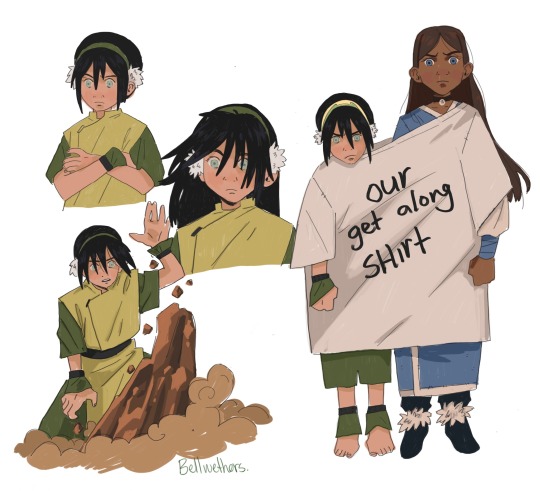
Tough.
#forgive me if the get along shirt has been done#I think it works for a lot of characters in this show#big toph love#I had so much fun drawing her#also still working on roughing up my style bit by bit#toph beifong#atla toph#fanart#atla#atla fanart#avatar#avatar the last airbender#the last airbender#atla katara#katara#toph avatar#toph atla
31K notes
·
View notes
Text
"consuming media" is such an overstatement. at best I'm sipping it
#not *savoring* it#just sipping it#slowly and lackadaisically and absently mindedly taking a bit here a bit there#no rush. I'll watch one or two episodes now. and finish the season circa 2029#(it might even have a whole new season by then)#listen my goal is not to get “caught up”#my goal is to get through 15% of the narrative and enjoy it! it's fun! it's good stuff! i really like where this is going!#and then i firget about it for 2 years and have to rewatch everything I've seen#and then i get to the 30% point and yeah wow! this is fun! i enjoyed that! time for a little break#and then another 2 years pass and i forget about it and have to rewatch from the b
6K notes
·
View notes
Text



Shadow's No Good, Very Bad Day
#Sonic#The Murder of Sonic the Hedgehog#tmosth#Shadow the Hedgehog#Amy Rose#Blaze the Cat#Rogue the Bat#Barry the Quokka#Fanart#MSPaint Draw#had some of these sitting in drafts for a bit bc my attention got pulled in six other directions 😅#but that's fine bc now i got it done ahead of time for it's 2nd anniversary and now it seems intentional 😉👍#I love Shadow in tmosth he's so silly and takes non-stop Ls#biggest of them is getting accused of 'murder'#but let's not forget all the little Ls he took along the way#love him dearly and drawing him in situations is fun#and also just a vague hint of a suggestion of sonadow for that last strip bc it's my comic set and i said so#anyway happy birthday to Peak 😆 go play Murder of Sonic the Hedgehog
4K notes
·
View notes
Text
this week on game changer, I am faced with the realization that good actors are, in fact, good actors
#game changer#game changer spoilers#god they got me SOOO fucking good#truly was not expecting it at all#I really wanna rewatch it again with context now because like erika and izzy and jiavani especially i fully believed were fucked UP#but no they just! are like that!!#also in hindsight makes me respect sam/the showrunners even more#of COURSE he would get consent from them to drink on camera#of COURSE he would keep them sober for the duration of the episode anyway#like obv we’ve had drinking on game changer before (sam says 3) but that was fully voluntary on the party bus#and this would’ve been a ‘u gotta drink as part of the rules of the game’ thing instead#but nah they’re all sober as shit!#which makes all of their drunken kissing and ass touching etc both funnier and more fun to watch from the audience#bc u know their judgement isn’t impaired at all from alcohol#they’re just fully committing to the bit#yippee!!!!!
3K notes
·
View notes
Text
it’s not necessarily that I hate the themes most prevalent in fiction set in the real world and it’s not necessarily that I don’t like stories revolving around real people or relationship drama or interpersonal issues it’s more like im a dog who doesn’t recognize that a pill is still a pill if it has peanut butter on it. I need like the little peanut butter spoonful that is aliens or robots or monsters or time travel or something fantastical and not at all down to earth real life so that you can approach me and be like “this story is about how friendships can deteriorate over time and also how this guy feels bad for being a bad friend and causing his buddy problems with their girlfriend” and then look at me making a face at you and be like “AND! they’re all aliens who are doing all that across spacetime” and I’ll be like OHHHHHH OKAY YAY (shlop shlap shlup the sound of a dog horking down peanut butter pills) wow what a poignant story
#kipspeak#I tend to gravitate away from things that are that close to real life for reasons im still sussing out. Feels like work? Feels too direct?#Maybe it’s just not fun? But you could tell the EXACT SAME story just with magic sword knights and I’ll be like YAAAAAAAAAAAAAYYYYYYY#I dunno. I feel like that’s slightly shallow of me but I also feel like I don’t care and it’s my house and I can think stories set on norma#Earth with nothing else different are boring#It’s like when they’re real life like that#Every theme they try to get across comes and sits in my house and goes Hey. I’m telling you about YOU and THE WORLD.#And im like ugh. Okay. Whereas magic sword knights do that and im like omg…. They’re telling us about You and The World. That’s crazy……#It is also maybe a little bit that I don’t like interpersonal drama as the driving focus of a story#They should go to space about it#otherwise im in class and I need to adopt an entirely different mindset to be able to have fun with what you just gave me#man these guys aren’t even furries. Lame dude……
4K notes
·
View notes
Text


so... some people on tiktok have been making sibling swap stuff, except a lot of them feel like either color palette swaps/miss the entire points of these characters so I decided to make my own because I was being autistic about it. so now I have an entire au :3c
I have more of these designs in the works but have these two for now
#beri art#I could yap about this au if people wanted to hear about it#I'm not making this to shit on anyone else's ideas btw this is just for fun#if someone gets on small detail wrong I do lose my mind a little bit#I'm just really autistic about mlp#also these designs are based off of my own redesigns for the mane 6#and their siblings#mlp#mlp fim#my little pony#my little pony friendship is magic#mlp fanart#my little pony fanart#my little pony au#mlp au#mlp sibling swap au#sibling swap au#fluttershy#zephyr breeze#twilight sparkle#shining armor
5K notes
·
View notes
Note
In regards to the cog-less megs comic: im sure op would be sooo normal and well adjusted if he found out abt that happening/saw him without his cog


I was actually working on another (angst) version of this but you get the funny haha version first :3 Bee and Elita are giving Optimus a 10 minute window before they intervene (they’ve seen OP moping around and are hoping this will help him get some it out of his system. They’ll have to step in at some point or else he probably won’t let go).
Why he’s small here and here
#maccadam#transformers#megop#megatron#optimus prime#transformers one#d-16#orion pax#tf one#Elita one and bumblebee for a brief moment#op thinks if he hold on for tight enough and long enough he could have d-16 back#megs get a few good hits in before Optimus got him into that hold#he does NOT like op being bigger than him#he’s used to always being just a bit bigger#I don’t mean to keep drawing cogless megs but here we are#sad version of what if Optimus sees cogless Megatron will be up at some point#pretend the high guard aren’t here bc they would not let this fly#or starscream would be making fun of him which is just as bad#soap ask
4K notes
·
View notes
Text
























Happy one year anniversary ISAT! To celebrate I wanted to share the lil strips I made for my friends when they reached the end of the game! They're all meant to be snippets of life post game and a glimpse into the world I'm making for Loop.
#isat#in stars and time#in stars and time spoilers#so to explain the last two strips#loop makes a third wish in their head about how they want to know what the future holds for them#and that flashes them to the change god who also did not see that coming#the change god and loop chat a bit and the last strip is the tail end of the conversation: a fun tip that loop can look human again#the starry curtain and faint hand is meant to be the Universe but not as an actual deity just as a stand in image for an unstoppable force#like yknow the hand that crafts the wishes#and reminder for loop that the universe is always there watching and its time to get back to the world stage#what do they do next???? maybe ill share my thoughts later#the draws
7K notes
·
View notes
Text
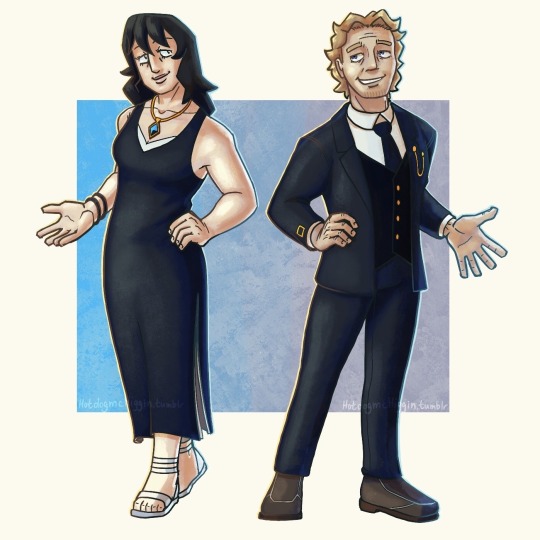
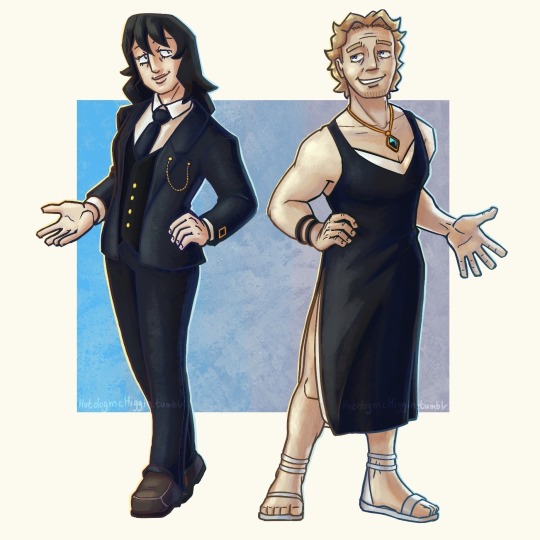
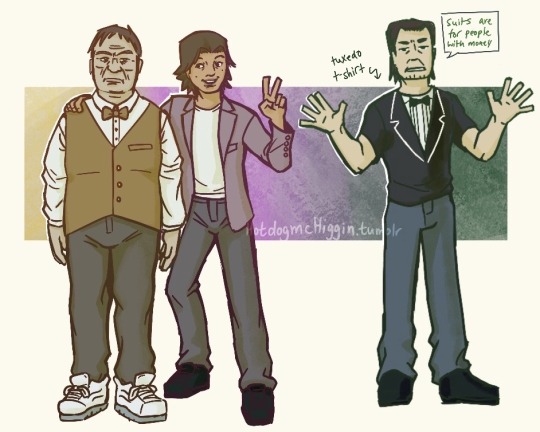
Company Mandated Fancy Fits on the Tulpar 😏
Also had to include the REAL star of the show (and a bonus)
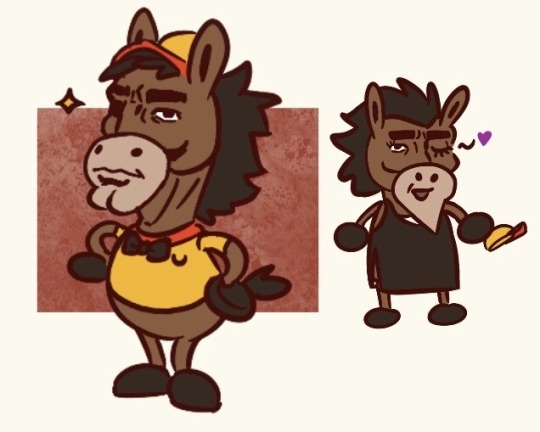
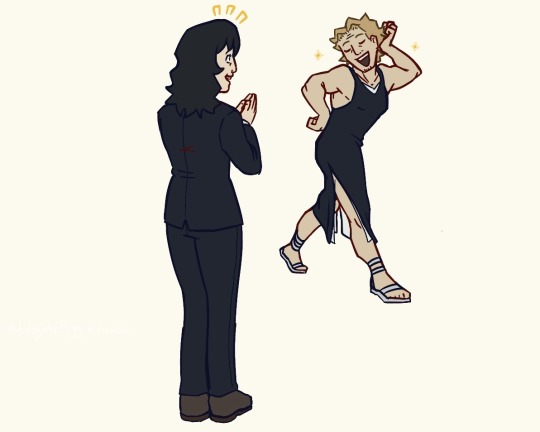
Based off of this and this. Thank you very much joetastic for being inspirational 👍
The REAL reason this is late

#just pretend I posted this like 6 days ago 😁👍#<-got distracted#sorry I’m Afflicted with The Curse and everything just takes me a long time#also right now I’m just kind of being experimental with my workflow and style right now so stuff is just naturally taking a bit longer#mouthwashing#mouthwashing fanart#anya mouthwashing#mouthwashing anya#nurse anya#curly mouthwashing#captain curly#mouthwashing curly#swansea mouthwashing#daisuke mouthwashing#jimmy mouthwashing#myart#anyway my new years resolution is to put more WOMEN in SUITS and MEN in DRESSES#had fun drawing this but still not too sure about the rendering style just yet. probably just gonna keep playing around with shit#IM DOING IT SCARED but im DOING IT#im also still trying to figure out how to Social Media#am i doing it right#GRAAAHHHHHHH I NEED TO BETTER UNDERSTAND FORMATTING POSTS#i have a more serious mouthwashing piece in the works but wanted to get this done first lol#honestly I have a buncha sketches I should post too#i like them but they’re not really composited very well if you catch my drift. been having trouble with sketch page layout recently#which is kind of antithetical to the idea of a sketch page but you know how it is with spaghetti#i doodled the others on the side and liked how they looked so i just put some color and basic shading on them#edit: realized i forgot to change the color of the ‘lapel’ on jims shirt lol
4K notes
·
View notes
Text

'what do u want to draw' 'idk, megumi?'
#my art#jujutsu kaisen#jjk#jjk fanart#fushiguro megumi#megumi fushiguro#jujutsu kaisen fanart#jjk megumi#when in doubt . megumi#almost drew more free i was *this* close to a makoto or makoharu sheet u have no idea the effort it took pls applaud my restraint#regardless tho im having lots of fun w this way of doing hair#fr the longest time the heavy chunked layers were always a look tht i could never get right#but i think ive gotten there finally!! or am getting there#it was easier w haru than with megu but ! still pleased#also idk if i will have time to draw anything else before i leave so i rushed a bit 2 get this up#maybe ill have time fr another sketchy doodle in between packing and prep dgsdfj who knows !! i will try tho
5K notes
·
View notes
Text
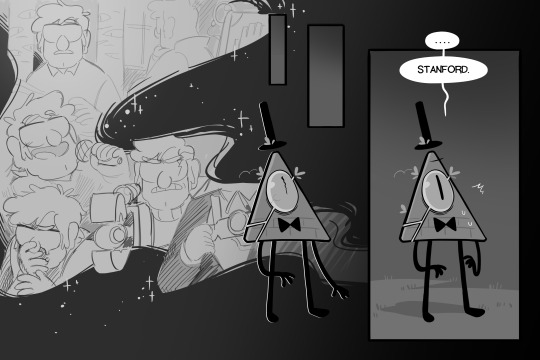
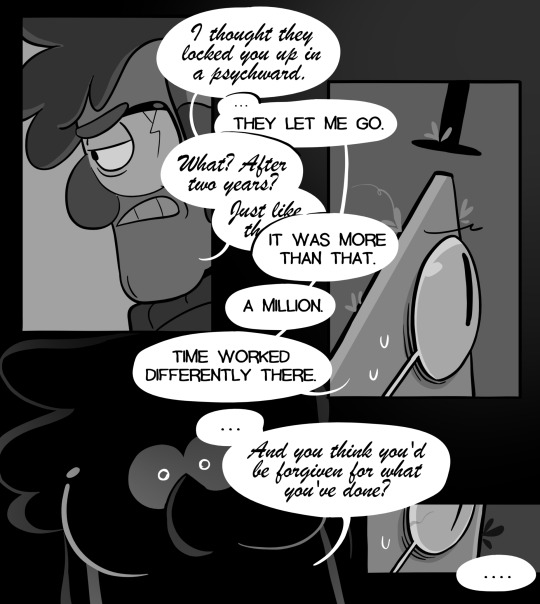



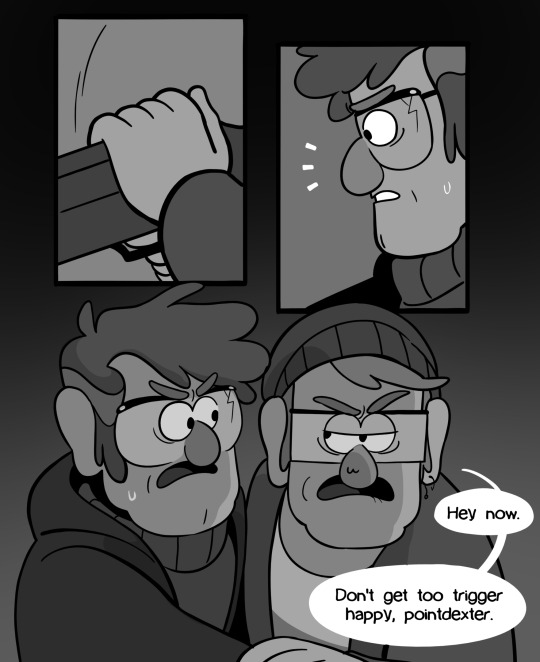
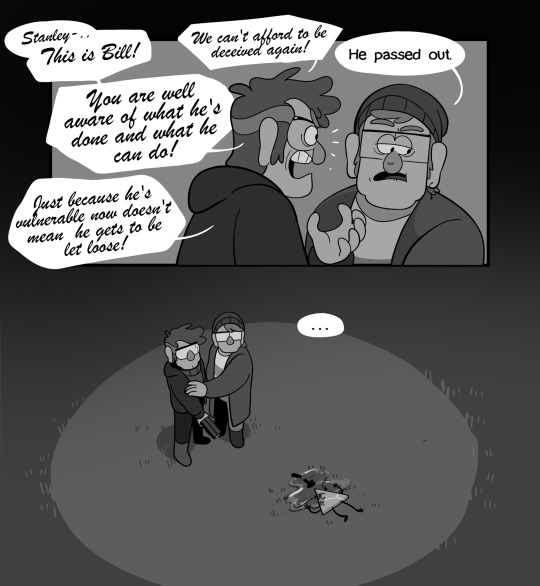
prev | next
#gravity falls au#return to falls#post-theraprism au#bill cipher#stanford pines#stanley pines#ford#stan#my art#comic#i gave up on giving names to these parts lmao#taking a while because these comics gets longer each posts#im having a lot of fun making them tho. it gets a bit interesting from here so i hope you enjoy
5K notes
·
View notes
Text




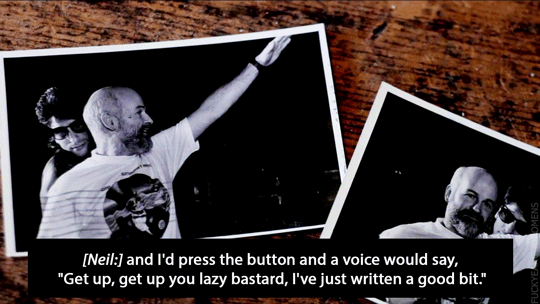

From the Neil Gaiman: Dream Dangerously :) (you can watch it here in US or with US vpn :) <;3) (or just this bit on youtube here :))
Terry Pratchett: One day he rang me up and said, "I've started a book and, I think it's good, but I haven't the faintest idea where it goes." So, I said, "All right, well, send me the pages." And I read it and wrote him back and said, "I don't know where it goes either, but I do know what happens next."
Neil Gaiman: I was pretty much nocturnal then, so I would write my chunk of Good Omens before I went to bed, and I'd go to sleep about five o'clock in the morning and I'd get up about one o'clock in the afternoon and my answering machine would be flashing on, and I'd press the button and a voice would say, "Get up, get up you lazy bastard, I've just written a good bit."
Terry Pratchett: We did it as a kind of holiday, because if it crashed and burned, nobody would notice.
#good omens#gointerviewedit#terry pratchett#neil gaiman#terry and neil#terry interview#interview#neil interview#gnu terry pratchett#neil gaiman dream dangerously#fun fact#btb#dream dangerously#❤#get up get up you lazy bastard I've just written a good bit
19K notes
·
View notes
Text

Remembering how fun he is to draw
#cure to my art block#bless you Perry the Platypus#fun to draw him in casual clothes but also I think the bit with his character would be that he’s always dressed for work#scene opens you see perry tucked into bed#he gets called on a mission and when he throws the cover off he’s already in his usual outfit#y’know?#it’s a classic#anyway#phineas and ferb#perry the platypus#human perry#pnf#my art
3K notes
·
View notes
Text

i smack them together like dolls to make them kiss
#my art#hey#this is art i did maybe a year ago LOL#didnt like it back then but#idk i think its kind of fun now in retrospect#ive been in the worst art funk i need something to get me out of it#disco elysium#disco elysium fanart#harry du bois#kim kitsuragi#harrykim#kimharry#frankly a bit absurd that this fandom never came up with a better name for this pairing#unless ive just missed it#possible
3K notes
·
View notes